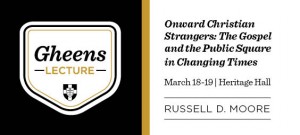A gospel-focused reenergizing of politics
American evangelicals are, sometimes frantically, trying to adjust to an increasingly post-Christian America. We can no longer pretend that we are a “moral majority,” sharing “values” with the American mainstream. In a quest to differentiate themselves from the activism of previous generations, some younger evangelicals wish to retreat into a libertarian cultural isolationism, and some…
American evangelicals are, sometimes frantically, trying to adjust to an increasingly post-Christian America. We can no longer pretend that we are a “moral majority,” sharing “values” with the American mainstream. In a quest to differentiate themselves from the activism of previous generations, some younger evangelicals wish to retreat into a libertarian cultural isolationism, and some wish to adjust to the ambient culture.
Those who wish to retreat are wrong. Pulling back from politics or cultural engagement is the wrong approach. What we need is actually a reenergizing of politics. Many have rightly grown cynical of movements that are willing to adopt allies that are gospel heretics as long as they are politically correct (such as Glen Beck or Donald Trump). They are disenchanted with movements that seem more content to vaporize opponents with sound-bytes rather than to engage in a long-term strategy of providing a theology of gospel-focused action in the public square.
We must engage the culture. The question is why and how. We engage politically because we love our neighbors; we care about human flourishing. But we do so on multiple fronts. We engage on Capitol Hill on issues ranging from stopping the abortion industry, to protecting religious liberty, to speaking out for human rights for the persecuted overseas. We also cultivate churches that see the holistic nature of the kingdom of God and who shape the consciences of people to live as citizens. But we always do that with the mindset that we are ultimately seeking to point people to the Lamb of God who takes away the sin of the world.
That means that we speak and we vote and we mobilize, but we don’t do so as gloomy pessimists, continually wringing our hands or crying conspiracy. And we don’t do it as naïve utopians, believing we can organize our way back to Mayberry. We do it as those who weep for those around us who are being sifted by the darkness. We do it as those who are cheerily marching to Zion, knowing that whatever the short-term setbacks, we are on the winning side of history.
We recognize that our vote for President of the United States is crucially important and we will be held accountable at Judgment for whomever we hand the Romans 13 sword to. But we know that our vote on the membership of our churches is even more important. A church that loses the gospel is a losing church, no matter how many political victories it wins. A church that is right on public convictions but wrong on the gospel is a powerless church, no matter how powerful it seems.
That means modeling a Christian political engagement that doesn’t start or end with politics alone. It starts and ends with the gospel and the kingdom of God. In his public ministry, Jesus addressed everything, body and soul, public and private, political and personal, but did so with the cross in his vision at every point. That’s what the church has done in every era, and that is what we must continue to do today.
__________________
Russell Moore is President of the Ethics & Religious Liberty Commission of the Southern Baptist Convention, the moral concerns and public policy entity of the nation’s largest Protestant denomination. He is a frequent cultural commentator, an ethicist and theologian by background, and an ordained Southern Baptist minister. Moore is author of several books, including the forthcoming Onward: Engaging the Culture without Losing the Gospel. A native Mississippian, he and his wife Maria are the parents of five sons.
We are honored to welcome Dr. Moore back to campus for the 2015 Gheens Lecture. Join us March 18-19, 2015 as Dr. Moore addresses evangelical engagement in the public square.



